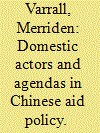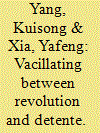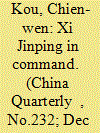| Srl | Item |
| 1 |
ID:
143629


|
|
|
|
|
| Summary/Abstract |
As China's aid has increased, so has scrutiny by the international development and foreign policy community. Despite recognition that foreign aid policy is a result of domestic political contests, the existing literature tends to overlook Chinese debates about the purpose of aid, and how that purpose should be achieved. This paper argues that examining these debates shows that Chinese aid is not a well-considered element of an overarching strategy. Rather, where foreign aid is considered relevant vis-à-vis China's goals, its use is hotly contested. Competing actors' varying agendas, rather than any coherent strategy, underpin inchoate aid projects.
|
|
|
|
|
|
|
|
|
|
|
|
|
|
|
|
| 2 |
ID:
095533


|
|
|
|
|
| Publication |
2010.
|
| Summary/Abstract |
After nearly twenty-two years of confrontation and hostility between the United States and the People's Republic of China (PRC), U.S. president Richard Nixon made his historic trip to China and met with Chinese supreme leader Mao Zedong in February 1972. Nixon's one week in China represented a profound turning point in U.S.-China relations. The historic Nixon-Mao handshake stood as a great diplomatic victory for Beijing as well. The Chinese leaders could now focus their attention on the Soviet threat and avoid fighting a possible two-front war. A Chinese Communist party (CCP) Central Committee (CC) document hailed the summit for its success in "utilizing [others'] contradictions, dividing up enemies, and enhancing ourselves," and credited this to Mao's "brilliant decision" to invite the U.S. president.1 Nixon and Mao have often been given credit for achieving U.S.-China rapprochement in the early 1970s. Was Mao really a realistic leader as many have suggested?
|
|
|
|
|
|
|
|
|
|
|
|
|
|
|
|
| 3 |
ID:
156602


|
|
|
|
|
| Summary/Abstract |
The PLA has been a key player in Chinese elite politics since 1949. However, a series of developments over the last four years has prompted China watchers to re-evaluate Party–military relations. This paper argues that CCP–PLA relations in the Xi Jinping era are characterized by the centralization of power in a single civilian individual. This centralization is reflected by events such as a new emphasis on the CMC chairman responsibility system, the establishment of new coordination bodies under the top leader, radical reforms to the military command structure, the promotion of Xi's public image as the top leader, and large-scale personnel reshuffes during which Xi's trustees have gradually come to occupy key military posts while his rivals have been removed. For Xi, these measures are an antidote to the principal–agent problem in CCP–PLA relations caused by both information asymmetry and the discrepant interests of civilian leaders and the top brass of the PLA.
|
|
|
|
|
|
|
|
|
|
|
|
|
|
|
|